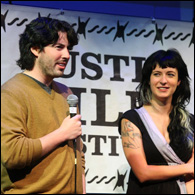

|
| home | movie reviews | features | sov horror | about | forum |
The Juno Interviews, Part IV: Jason Reitman & Diablo Cody
Shy, reserved wallflower Diablo Cody famously worked as a professional stripper, blogger, and raconteur before her screenplay for Juno shot her into the upper crust of Hollywood elite. Juno's director, Jason Reitman, comes from a much different background: son of the famous comedy director Ivan Reitman, he seems to have inherited his father's touch for moviemaking, both with this film and his previous effort, Thank You for Smoking. The two recently sat down with the press to discuss their work, their creative partnership, and other items of interest. Question: I am really interested in the tone of this movie, because it would be really easy for a film like this to get too quirky or twee. How did you guys work to keep the tone in hand? Diablo Cody: I can't take responsibility for the tonal choices made in this film. I am not an experienced filmmaker, but I am discovering that it is something the director establishes. Because my screenplay, I think, is inheritably kind of quirky and twee. I was influenced by quirky and twee movies when I wrote it. And then Jason came in, and he is the master of tone and was able to strike the right balance. Jason Reitman: That's actually part of my formal name now. You know how there's a Masters of Horror series? I'm the Master of Tone... (Laughter.) Me and Alexander Payne, baby. One of the things that I loved originally about the screenplay is something that I loved the first time I read the book Thank You for Smoking. Here was a subject matter that could have easily been sensitive, politicized, and emotionally heavy, and yet it did not do that at all. It spoke about the issue in a very frank way and a very non-judgmental, open-minded way. It was not just one or two characters, it was every character. We had seven strong characters throughout this film, who were all very well thought-out, clear human beings, who all had fresh perspectives on the same idea. Diablo grew up in a very Juno MacGuff-like house, and I grew up in a very Loring-like house [Vanessa and Mark Loring are the couple who agree to adopt Juno's baby]. You know the white photos on the stairwell for their home? I did that as a kid. That is my house. So because of that, I think there's this kind of air of non-judgment to both sides. It is not a film where Juno is cool and the Lorings are assholes. Nor does it come from the Lorings' perspective where they're really normal, and who is this weird kid? We tried not to judge either side, because there was common ground on both sides. As a director, I do think I'm good at tone. Every director has a gift. Fincher can shoot the lights out and I can't touch him. Other directors do all sorts of things that I can't touch, but for whatever reason, I think I have a good gut for tone. I was raised by a director who's ruthless with tone as well, and who taught me to cut things out that don't fit. So because of that, no matter how funny a theme is, no matter how much I like a scene, if it is outside the rhythm of the film -- outside the tone of the film -- it's gone. DC: We are actually both good at killing things. There are lot of people who are very precious about that kind of thing. And it's helpful that neither of us is, because we're willing to sacrifice our creative children for consistency. JR: That's part of our relationship. There is often so much animosity between a writer and director. I think one of the reasons this film really worked was not only that we brought two perspectives, but there was no ego between us, and there was nothing precious. I don't think either of us ever fought the other one's decisions. We were both clear about how we needed to do it. There was one time: the MPAA had to cut one word. DC: Yeah, it was the MPAA, and that broke my heart. JR: The word was balls. Q: But it's an R-rated movie. JR: It's a PG-13 movie. Balls can be used. The problem was that it was used in a term that visualized sexuality. I don't want to discredit the MPAA because they actually really liked this film, and they let a lot of things slide because they thought it was an important film for teenagers to see. Because of that, they actually made us cut very little. There was some heartbreaking stuff, but they actually really loved this film. So I am very proud, actually, of what they did by giving us a PG-13. Q: What is it about these Canadian kids? Both Ellen Page and Michael Cera give real break-out performances... DC: I am a convert now. JR: Yeah, I am a Canadian and I think we are going to make Diablo Canadian too. DC: When I first started working in Hollywood a couple of years ago, I was very much this hayseed from the Midwest. I think the Canadian thing is similar to the Midwestern sensibility. People would always tell me that good dark comedy always comes out of there, you know? The Coen Brothers and Alexander Payne, who's from Omaha, and that kind of stuff. People would say, "You know, we like to see that perspective as opposed to the usual Los Angeles/New York thing." Canada isn't exactly the same, but there are certain similarities. JR: There's a Second City element to Canada. DC: Yeah, there is freshness there. And I also feel that the young actors coming out of Canada are not as affected or insincere as the kids you see in Los Angeles. JR: There's something interesting about their voice. There is a maturity but -- in a weird conflicting way -- they have held onto their innocence. Whereas the kids who grew up in Los Angeles and New York seem immature and yet have lost all their innocence. What makes Ellen and Michael truly special is that they are incapable of having dishonest moments. And that is what I look for in actors. With dialogue like Diablo's, it's very easy have a dishonest take on it. I mean, take the line where Ellen says, "You do this all without trying hard at all," and Michael's response is, "Actually I try really hard." That's very hard to deliver because you don't want him sounding insincere. You don't want him trying to make some sort of joke. It has to be authentic and heartbreakingly sweet. That's very hard to do... and he does it and he makes it look so easy. Q: How many takes? JR: Oh, that's Take 1. I could have had three feet of film and gotten that scene. Those two actors, no matter what they are doing, there is an authenticity that makes the scenes feel real and it makes us care. Q: Can you talk about working with Jason Bateman and getting the right sort of balance for his character? He doesn't seem like the dirty old man you would expect him to be, but more like somebody kind of wistful. JR: That was the trickiest character to nail. Jason and I both became fathers in the year leading up to this film, so, we had fresh perspective on what it is like to have a baby, to have your life change, and to kind of close a chapter of your life and open up a new one. And that was the thing: we didn't want him to be hated. We wanted him to be real... and not dirty. I think at the end of the day, the idea that we latched onto was that he and Juno were not flirting with each other as much as they were flirting with each other's time periods. Here is a man flirting with the idea of being a child, and here is a girl who is flirting at the idea of being an adult. And like many teenage girls right now, there is this idea that she could just make a decision and childhood would end. Certainly, she's pregnant, so she could easily become an adult the next day, but there's still a fallacy to the assumption that she could just become an adult like that, when she's still 16. That, in fact, is what they were flirting with. So using that as a guideline, we could do a scene like the basement, which is by far the hardest scene I have ever had to direct. It never became about whether they were flirting too heavily with each other. As long it followed this interest in where the other person was in life, it could seem dangerous without being wrong. Q: Diablo, how necessarily was it for this film to take place in Minnesota, where you grew up? Could you have set the story somewhere else? DC: Oh absolutely. In Arizona, maybe not so much, because I have this picture of the Southwest aesthetic and coyotes wandering through the shot. But it was very important to me that it did not take place in one of the usual locales: Los Angeles or New York. It also needed to take place in a region of the country that felt sheltered: where a pregnant teenager would be considered unusual. You know, the gaze of Juno's peers becomes increasingly judgmental as she becomes more pregnant, whereas there are certain schools in this nation where every other girl is pregnant. Q: Almost automatically, people have started looking at this subject in political terms. Is that something you thought about at all? JR: No, we never had a conversation about it... DC: We never did. Early on, when I was writing it, I thought, "I guess this could be a potentially controversial subject." JR: But that seems to be a projection. It's interesting. When I did Thank You for Smoking, the best compliment we ever got was that liberals thought it was their film and conservatives thought it was their film. Christopher Buckley used to say, "That's what satire is." Satire is a mirror, and you see yourself in it. Juno is not a satire, but in some ways, I guess it's a mirror. Q: Jason, you are producing Diablo's next screenplay. Are you the director? JR: No I am not going to direct it. We are going to find someone who is perfect for that. But, I think my aspiration for it is that it becomes to teenage whores what Juno is to teenage pregnancy, which is kind of return to form or a return to warmth within teenage movies. Q: Is this the beginning of a long-term partnership? JR: I hope so. DC: Yeah, that would be cool. Interview transcript by Debbie Davis. Article published 01.27.2008. More from The Juno Interviews:
Also read: Rob Vaux's review of Juno.
|


|
| home | movie reviews | features | sov horror | about | forum |
| This site was previously at flipsidemovies.com from 2000 to 2008. |
|
contact | copyright | privacy | links | sitemap
Flipside Movie Emporium (FlipsideArchive.com)
|